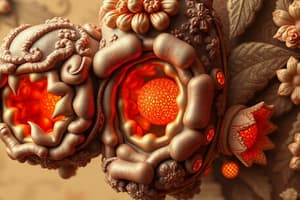Podcast
Questions and Answers
What is the most common benign tumor of salivary glands?
What is the most common benign tumor of salivary glands?
- Canalicular Adenoma
- Basal Cell Adenoma
- Pleomorphic Adenoma (correct)
- Warthin Tumor
Which of the following tumors is typically associated with smoking as a risk factor?
Which of the following tumors is typically associated with smoking as a risk factor?
- Adenoid Cystic Carcinoma
- Mucoepidermoid Carcinoma
- Warthin Tumor (correct)
- Acinic Cell Carcinoma
Which malignant tumor is most commonly found in the major salivary glands?
Which malignant tumor is most commonly found in the major salivary glands?
- Carcinoma ex-pleomorphic adenoma
- Acinic Cell Carcinoma
- Mucoepidermoid Carcinoma (correct)
- Adenoid Cystic Carcinoma
What is a distinguishing clinical feature of Adenoid Cystic Carcinoma compared to Pleomorphic Adenoma?
What is a distinguishing clinical feature of Adenoid Cystic Carcinoma compared to Pleomorphic Adenoma?
What age group is primarily affected by Mucoepidermoid Carcinoma?
What age group is primarily affected by Mucoepidermoid Carcinoma?
Which type of salivary gland tumor is typically bilateral?
Which type of salivary gland tumor is typically bilateral?
Which malignant tumor is known for a poor prognosis and a high rate of local recurrence?
Which malignant tumor is known for a poor prognosis and a high rate of local recurrence?
What type of cells are primarily found in Mucoepidermoid Carcinoma?
What type of cells are primarily found in Mucoepidermoid Carcinoma?
Which salivary gland tumor is characterized by a well-defined encapsulation and presents as a painless rubbery swelling?
Which salivary gland tumor is characterized by a well-defined encapsulation and presents as a painless rubbery swelling?
What is the histological characteristic of Acinic Cell Carcinoma?
What is the histological characteristic of Acinic Cell Carcinoma?
Flashcards
What is a pleomorphic adenoma?
What is a pleomorphic adenoma?
Benign tumor originating from epithelial tissue, not mixed origin. Most common salivary gland tumor, characterized by slow growth, well-defined capsule, painless swelling, and rubbery texture on palpation.
What is a canalicular adenoma?
What is a canalicular adenoma?
Benign tumor of salivary glands, commonly found in the upper lip and parotid gland. Characterized by small, well-defined nodules that may cause slight swelling.
What is a Warthin tumor?
What is a Warthin tumor?
Second most common salivary gland tumor, originating in parotid gland. Primarily affects smokers, characterized by slow growth, soft or rubbery texture, and usually painless. It often presents bilaterally, meaning it occurs in both parotid glands.
What is a mucoepidermoid carcinoma?
What is a mucoepidermoid carcinoma?
Signup and view all the flashcards
What is an adenoid cystic carcinoma?
What is an adenoid cystic carcinoma?
Signup and view all the flashcards
What is an acinic cell carcinoma?
What is an acinic cell carcinoma?
Signup and view all the flashcards
What is a carcinoma ex-pleomorphic adenoma?
What is a carcinoma ex-pleomorphic adenoma?
Signup and view all the flashcards
What is a basal cell adenoma?
What is a basal cell adenoma?
Signup and view all the flashcards
What is an oncocytoma?
What is an oncocytoma?
Signup and view all the flashcards
What are ductal papillomas?
What are ductal papillomas?
Signup and view all the flashcards
Study Notes
Salivary Gland Tumors
- Benign Tumors (Adenomas):
- Pleomorphic Adenoma (Mixed Tumor): Most common, slow-growing, well-defined, painless, rubbery swelling on palpation, often in parotid gland. Can be unilocular or multilocular, with a fibrous capsule that can be deficient, leading to recurrence.
- Warthin Tumor (Adenolymphoma): Second most common, bilateral, slow-growing, painless, often parotid gland. Originates from epithelial tissue with lymph node involvement, not a lymphoma. Associated with smoking.
- Canalicular Adenoma: Common in upper lip, rare in parotid, slow-growing swelling.
- Basal Cell Adenoma: 1-2% of cases, seen in parotid, often in the upper lip.
- Oncocytoma: Eosinophilic, bilateral, parotid-favored.
Malignant Tumors (Carcinomas)
- Mucoepidermoid Carcinoma: Most common malignant salivary gland tumor in the major glands, often in parotid. Can present clinically like a benign tumor but can progress to malignancy.
- Adenoid Cystic Carcinoma: Second most common, often in minor salivary glands, especially in the palate, potentially involves nerves causing pain, anesthesia, and paresthesia.
- Acinic Cell Carcinoma: Rare, primarily parotid, any age, large granular basophilic cells in acinar formations. Can be slow-growing and initially seem benign.
- Carcinoma Ex-Pleomorphic Adenoma: Develops in a pre-existing pleomorphic adenoma after a long period. Characterized by a malignant component growing from a benign tumor. Increased risk of local recurrence.
Additional Notes
- Clinical Features: Swelling (slow or fast), pain (often absent in benign tumors), presence of ulcer or neural signs (important for malignant tumors).
- Histological Features: Important for diagnosis. Differentiates benign from malignant based on cell types, arrangement, presence of capsule, invasion into surrounding tissue.
- Prognosis: Can range from poor to good, depending on type, location, spread to lymph nodes, etc. Local recurrence in tumors with capsule deficiency is common.
Studying That Suits You
Use AI to generate personalized quizzes and flashcards to suit your learning preferences.




